Spring Boot(Spring Security)应用集成Keycloak实现统一身份验证、权限控制
前面介绍了前端应用如何集成Keycloak实现统一身份验证、权限控制,可参考 vue-element-admin集成Keycloak实现统一身份验证、权限控制 。如果对Keycloak还不太了解的话,可以参考Keycloak快速上手指南对Keycloak的基本概念进行了解。本文将讲述典型的Spring Boot/Spring Security服务端的应用如何集成Keycloak,以实现SSO登录、统一身份验证、权限控制等功能。
Keycloak后台配置
创建Keycloak客户端
服务端的web类型的应用,最常见的就是提供web页面服务以及Restful API。不同类型的应用,Keycloak后台创建的配置会稍微有些区别。下面将创建3个客户端:
spring-boot-keycloak-web srping-boot-keycloak-security-api spring-boot-keycloak-webapi
创建spring-boot-keycloak-web客户端
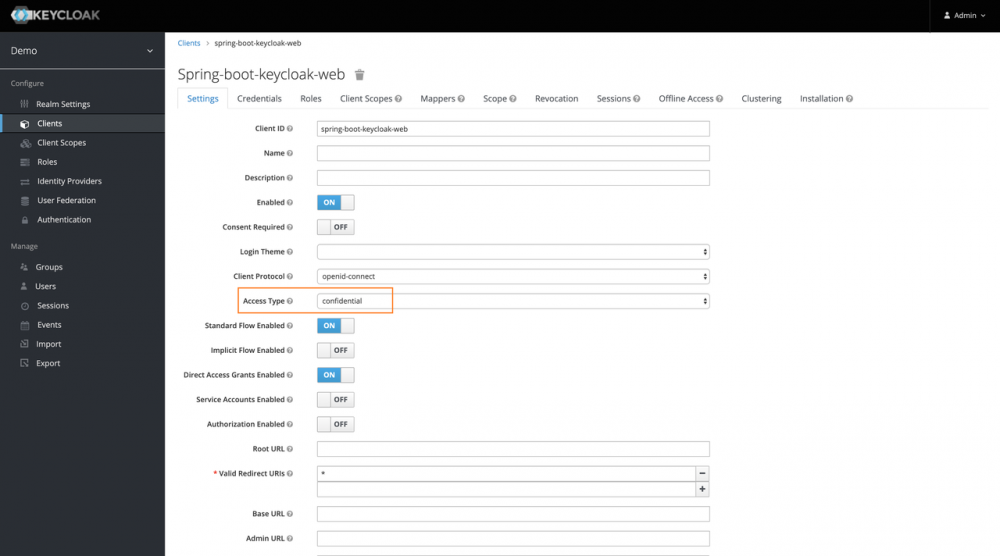
创建srping-boot-keycloak-security-api客户端
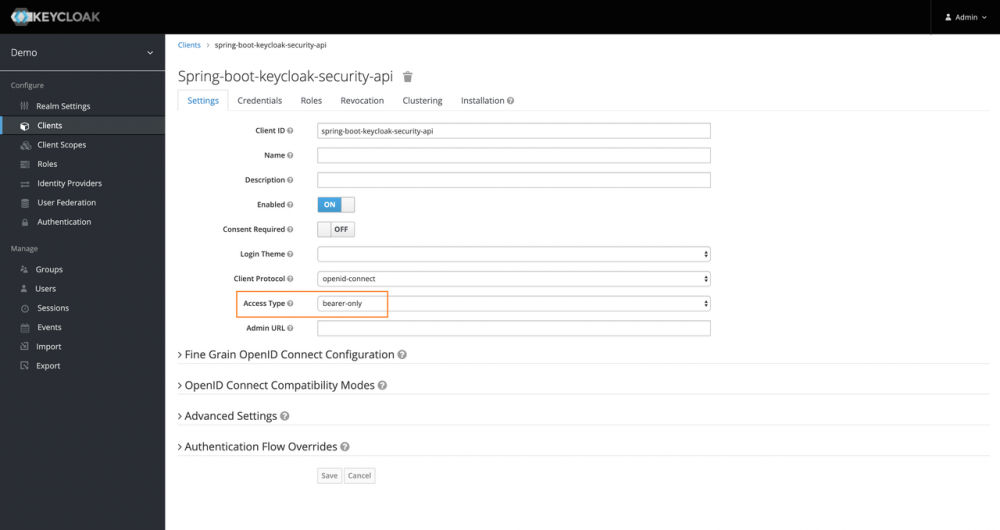
创建spring-boot-keycloak-webapi客户端
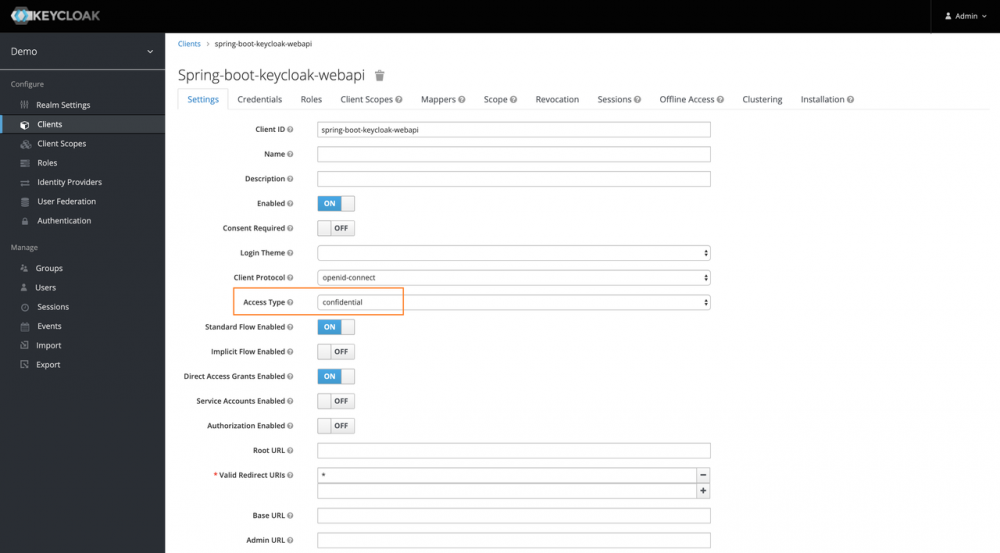
客户端访问类型(Access Type)说明
之前的文章已经说明过,这里再列一下,Keycloak目前的访问类型共有3种:
confidential :适用于服务端应用,且需要浏览器登录以及需要通过密钥获取 access token 的场景。典型的使用场景就是服务端渲染的web系统。
public :适用于客户端应用,且需要浏览器登录的场景。典型的使用场景就是前端web系统,包括采用vue、react实现的前端项目等。
bearer-only :适用于服务端应用,不需要浏览器登录,只允许使用 bearer token 请求的场景。典型的使用场景就是restful api。
创建角色、用户,并进行绑定
分别创建用户admin、customer,及角色ROLE_ADMIN、ROLE_CUSTOMER,并进行绑定
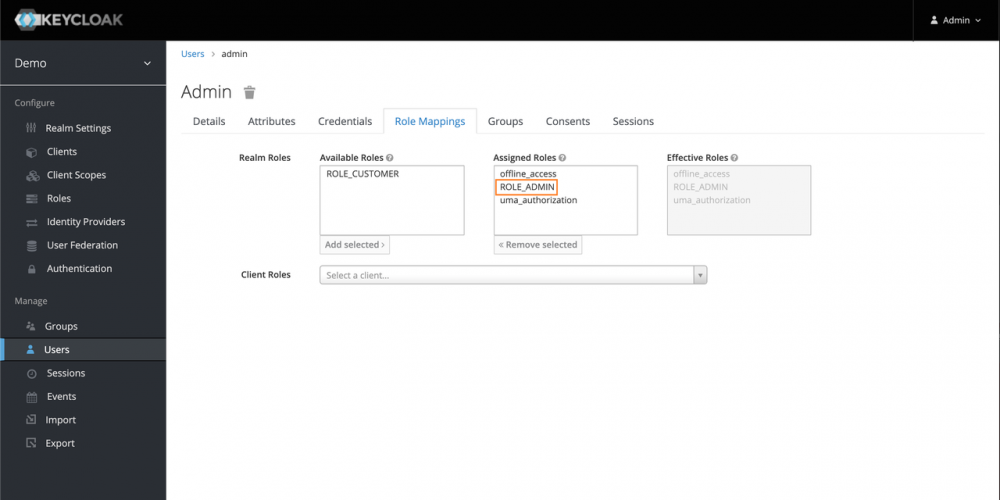
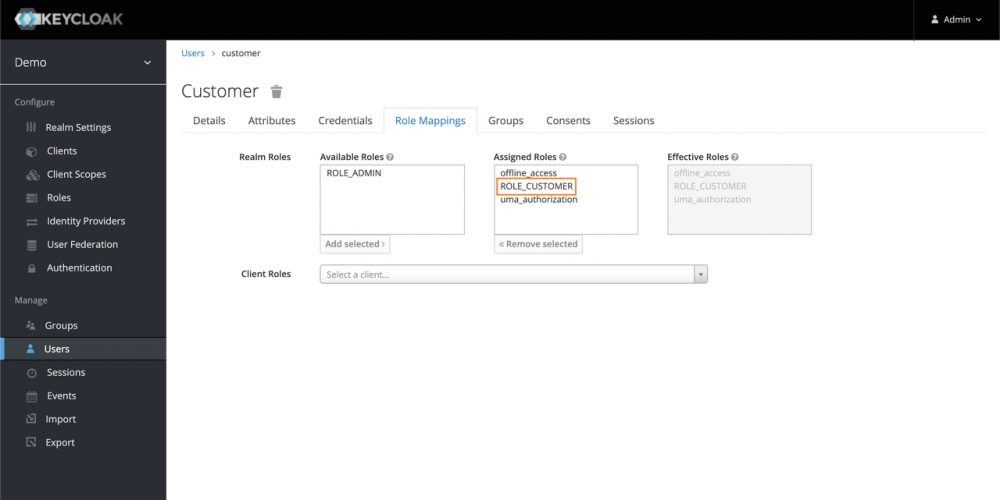
Spring Boot(Spring Security)集成Keycloak配置及代码
添加Maven依赖
Spring Boot集成keycloak依赖
<dependency>
<groupId>org.keycloak</groupId>
<artifactId>keycloak-spring-boot-starter</artifactId>
<version>${keycloak.version}</version>
</dependency>
复制代码
如需使用Spring Security,则添加如下依赖
<dependency>
<groupId>org.springframework.boot</groupId>
<artifactId>spring-boot-starter-security</artifactId>
</dependency>
复制代码
Keycloak关键配置
Keycloak配置文件示例
这里以同时提供web页面及Restful API服务的项目spring-boot-keycloak-webapi的配置为例,来看下怎么进行keycloak相关的配置
server:
port: 8083
keycloak:
realm: demo
auth-server-url: http://127.0.0.1:8080/auth
resource: spring-boot-keycloak-webapi
ssl-required: external
credentials:
secret: d50a059a-484b-4138-8403-22a491fbc488
use-resource-role-mappings: false
bearer-only: false
autodetect-bearer-only: true
security-constraints:
- authRoles:
- ROLE_CUSTOMER
securityCollections:
- name: customer
patterns:
- /customer
- authRoles:
- ROLE_ADMIN
securityCollections:
- name: admin
patterns:
- /admin
复制代码
realm :Keycloak后台对应的realm
auth-server-url :Keycloak的地址
resource :Keycloak后台创建的对应的Client
credentials.secret :Keycloak添加客户端后Credentials Tab内对应的内容
use-resource-role-mappings :使用realm级别还是应用级别的角色控制
bearer-only :应用的Keycloak访问类型是bearer-only设置为true,否则设为false
autodetect-bearer-only :应用同时提供web页面跟Restful API服务时需设置为true,Keycloak会根据请求的方式,将未通过认证的请求重定向到登录页或者直接返回 401 状态码
security-constraints :针对不同的路径定义相应的角色以实现权限管理,如果是集成Spring Security,则不需要此配置,改为在Spring Security相关的配置中控制
更多的配置控制可以查阅官方文档: Keycloak官方Java适配器配置
autodetect-bearer-only 机制说明
官方文档对于 autodetect-bearer-only 的说明比较含糊
Keycloak auto-detects SOAP or REST clients based on typical headers like X-Requested-With , SOAPAction or Accept .
针对HTTP请求头到底取什么样的值才被识别为是API类型的请求,其实并没有描述的很清楚。我们只能找到相应的源码来具体看下,实际实现到底是怎么样的。
源码位于 keycloak-adapter-core jar包中的 RequestAuthenticator 抽像类中
protected boolean isAutodetectedBearerOnly(HttpFacade.Request request) {
if (!deployment.isAutodetectBearerOnly()) return false;
String headerValue = facade.getRequest().getHeader("X-Requested-With");
if (headerValue != null && headerValue.equalsIgnoreCase("XMLHttpRequest")) {
return true;
}
headerValue = facade.getRequest().getHeader("Faces-Request");
if (headerValue != null && headerValue.startsWith("partial/")) {
return true;
}
headerValue = facade.getRequest().getHeader("SOAPAction");
if (headerValue != null) {
return true;
}
List<String> accepts = facade.getRequest().getHeaders("Accept");
if (accepts == null) accepts = Collections.emptyList();
for (String accept : accepts) {
if (accept.contains("text/html") || accept.contains("text/*") || accept.contains("*/*")) {
return false;
}
}
return true;
}
复制代码
通过上面这段源码,我们就能很清晰的知道,在 autodetect-bearer-only 配置设置为true时,HTTP请求头需满足以下几种情况,才被认为是API类型请求,这种情况下未通过认证直接返回 401 状态码而不是重定向到登录页
-
X-Requested-With请求头的值为XMLHttpRequest -
Faces-Request请求头的值以partial/开头 - 出现
SOAPAction请求头 -
Accept的请求头的值,不能包含text/html、text/*、*/*这些值
集成Spring Security的配置说明
如需集成Spring Security,则Spring Boot配置中的 security-constraints 可以删除,使用代码进行如下配置
@KeycloakConfiguration
public class SecurityConfig extends KeycloakWebSecurityConfigurerAdapter {
/**
* Registers the KeycloakAuthenticationProvider with the authentication manager.
*/
@Autowired
public void configureGlobal(AuthenticationManagerBuilder auth) throws Exception {
auth.authenticationProvider(keycloakAuthenticationProvider());
}
/**
* Read Keycloak config from spring boot config file
*/
@Bean
public KeycloakConfigResolver keycloakConfigResolver() {
return new KeycloakSpringBootConfigResolver();
}
/**
* Defines the session authentication strategy.
*/
@Bean
@Override
protected SessionAuthenticationStrategy sessionAuthenticationStrategy() {
return new RegisterSessionAuthenticationStrategy(new SessionRegistryImpl());
}
@Override
protected void configure(HttpSecurity http) throws Exception {
super.configure(http);
http
.csrf().disable()
.authorizeRequests()
.antMatchers("/customer/**").hasRole("CUSTOMER")
.antMatchers("/admin/**").hasAnyRole("ADMIN")
.anyRequest().permitAll();
}
}
复制代码
Controller相关代码
@RequestMapping(value = "/", method = RequestMethod.GET)
public String index() {
return "index";
}
@RequestMapping(value = "/customer", method = {RequestMethod.GET, RequestMethod.POST})
public String customer(HttpServletRequest request) {
KeycloakSecurityContext keycloak = (KeycloakSecurityContext) request.getAttribute(KeycloakSecurityContext.class.getName());
return "customer :: " + keycloak.getTokenString();
}
@RequestMapping(value = "/admin", method = {RequestMethod.GET, RequestMethod.POST})
public String admin(HttpServletRequest request) {
KeycloakSecurityContext keycloak = (KeycloakSecurityContext) request.getAttribute(KeycloakSecurityContext.class.getName());
return "admin :: " + keycloak.getTokenString();
}
@RequestMapping(value = "/logout", method = {RequestMethod.GET, RequestMethod.POST})
public String logout(HttpServletRequest request) {
try {
request.logout();
return "logout success";
} catch (ServletException e) {
LOGGER.error("keycloak logout error", e);
return "logout fail";
}
}
复制代码
项目效果演示
运行同时提供web页面及Restful API服务的项目spring-boot-keycloak-webapi,看下相关的效果
- 本文标签: http 认证 服务端 密钥 适配器 代码 spring provider Security servlet springboot IDE XML core 源码 Collection cat equals API rmi REST 文章 maven Spring Security UI Collections ssl src IO tar session SOA logo list ACE db Spring Boot 配置 HTML web client bean 权限控制 RESTful value 删除 tab id map App java build Action https token 管理 key
- 版权声明: 本文为互联网转载文章,出处已在文章中说明(部分除外)。如果侵权,请联系本站长删除,谢谢。
- 本文海报: 生成海报一 生成海报二










![[HBLOG]公众号](https://www.liuhaihua.cn/img/qrcode_gzh.jpg)

